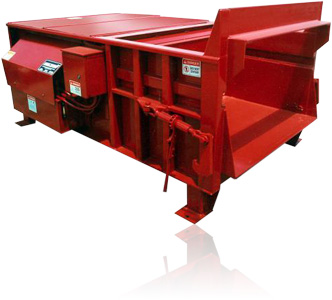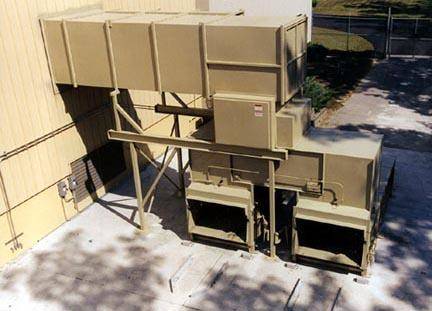The Function of Waste Equipment in Encouraging Sustainable Waste Disposal Practices
Waste Equipment serves an essential role ahead of time lasting waste disposal techniques. It includes a variety of devices developed to enhance the performance of waste collection, handling, and segregation. By utilizing Equipment such as compactors, shredders, and recycling bins, communities can considerably minimize their dependence on land fills. Nevertheless, the effect of these tools extends past functionality. Understanding their wider ramifications reveals insights into how they form environmental responsibility and neighborhood interaction. What exists in advance in this progressing landscape?
Recognizing Waste Equipment and Its Relevance
Waste Equipment plays a crucial role in efficient waste monitoring systems. It incorporates a variety of tools and equipment made to deal with, process, and take care of waste products efficiently. Understanding waste Equipment is very important for businesses, organizations, and districts intending to carry out sustainable garbage disposal methods - Commercial garbage compaction equipment. Effectively operating waste Equipment not just simplifies the collection and transportation of waste yet likewise reduces environmental effect by guaranteeing that waste is taken care of properly
The relevance of waste Equipment reaches improving reusing efforts, reducing land fill usage, and advertising resource recuperation. Equipment such as compactors, shredders, and balers assist in the handling of waste, making it easier to divide recyclable products from basic refuse. Additionally, developments in waste technology add to the advancement of more ecologically friendly remedies, consequently reinforcing the commitment to sustainability. Generally, waste Equipment functions as a foundation for reliable waste monitoring, cultivating a cleaner and much healthier setting for future generations.
Sorts Of Waste Equipment for Effective Waste Monitoring
Effective waste management relies upon numerous kinds of Equipment developed to attend to certain disposal needs. Amongst these, compactors play an essential duty by reducing the quantity of waste, making transportation a lot more effective. Shredders are essential for damaging down big items, helping with less complicated handling and disposal. Furthermore, balers press recyclable products into workable bundles, enhancing storage and transport.
Containers and bins are basic for gathering waste at the source, ensuring proper partition and decreasing contamination. For dangerous materials, customized Equipment, such as drum crushers and leak-proof containers, is needed to assure safety and security and conformity with policies.
Transportation automobiles geared up with hydraulic systems boost the effectiveness of waste collection and disposal procedures. Each kind of waste Equipment contributes to a streamlined waste monitoring system, promoting sustainability and lowering environmental impact via reliable disposal techniques.
The Role of Recycling Containers in Sustainable Practices
Reusing bins play a necessary duty in promoting lasting techniques by facilitating effective waste splitting up. By providing assigned containers for recyclable materials, they urge people to embrace green actions. This straightforward implementation substantially adds to decreasing garbage dump waste and enhancing recycling prices.
Reliable Waste Separation
Proper waste splitting up plays a vital duty in promoting lasting practices, and recycling bins act as a significant device in this process. By clearly comparing recyclables, compostables, and basic waste, these bins assist in effective sorting, minimizing contamination and making best use of reusing performance. Their tactical positioning in public and personal rooms encourages individuals to join responsible waste disposal. Moreover, using color-coded bins aids to streamline the separation procedure, making it user-friendly for customers. This business method not only boosts recycling rates yet additionally raises understanding about the relevance of waste monitoring. Basically, reusing bins are fundamental parts that support reliable waste splitting up, ultimately adding to an extra lasting atmosphere and reducing the general stress on landfills.
Encouraging Eco-Friendly Actions
Individuals may be inclined to neglect their impact on the setting, the presence of reusing containers greatly affects green habits. These containers offer as aesthetic reminders, motivating people to different recyclables from basic waste. Their critical placement in public spaces advertises accessibility, making it simpler for individuals to embrace lasting practices. Research studies indicate that when reusing containers are offered, recycling prices raise significantly, mirroring a direct correlation in between framework and habits. Furthermore, vivid signs on these containers educates customers regarding what materials can be reused, lowering contamination prices. By promoting a culture of recycling, these bins not just help with proper waste monitoring however also motivate a cumulative responsibility towards environmental stewardship, inevitably adding to a more lasting future.
Composting Solutions: Turning Waste Into Resources
Composting systems work as a crucial tool in transforming organic waste into important resources, offering various ecological advantages. Various sorts of composting Equipment provide to various demands, making the process easily accessible to both individuals and communities. Comprehending the composting process is important for maximizing its performance and promoting lasting waste administration practices.
Advantages of Composting Equipments
Several areas are progressively recognizing the numerous benefits of composting systems, which change natural waste into valuable resources. These systems successfully decrease land fill waste, consequently decreasing greenhouse gas discharges and conserving all-natural sources. By transforming food scraps, backyard waste, and various other organic materials into nutrient-rich compost, they enhance soil wellness and fertility, advertising lasting farming practices. Additionally, composting aids to maintain dampness in the dirt, reducing the need for chemical plant foods and watering. It fosters biodiversity by providing an environment for useful microorganisms and pests. Furthermore, composting informs individuals about ecological stewardship, encouraging a culture of sustainability. Overall, composting systems play a vital duty in producing a circular economic climate, where waste is minimized, and sources are recycled.
Kinds Of Composting Equipment
A variety of composting Equipment is available to facilitate the effective processing of natural waste into valuable compost. These systems vary from easy yard compost bins to advanced commercial composters. For home usage, tumblers and static bins are prominent, enabling convenient oygenation and mixing. Aerated static heaps use blowers to enhance air flow, significantly speeding up decay. Large-scale procedures might employ in-vessel composters, which manage temperature and moisture for optimal composting conditions. Worm composters, or vermicomposting systems, harness the all-natural digestive system processes of worms to break down natural matter. In addition, chippers and shredders assist prepare materials by reducing dimension, advertising faster failure. Each kind of Equipment offers particular demands, enabling diverse composting practices that add to sustainable waste administration.
Composting Process Explained
The composting procedure changes organic waste into nutrient-rich sources via a collection of chemical and biological reactions. Bacteria such as bacteria and fungis break down natural materials, consisting of food scraps and lawn waste. This decomposition creates heat, promoting further microbial activity and accelerating the breakdown procedure. As the compost grows, Clicking Here the temperature level lowers, enabling useful organisms to thrive. The existence of oxygen is essential, advertising aerobic problems that enhance microbial effectiveness. Throughout this procedure, carbon-to-nitrogen ratios should be maintained to maximize disintegration. The end outcome is humus, a dark, brittle material abundant in nutrients, which can be made use of to improve soil, assistance plant development, and add to sustainable farming practices.
Innovative Technologies in Waste Collection and Disposal
As cities grapple with enhancing waste volumes and environmental problems, innovative technologies in waste collection and disposal arise as necessary services. Smart waste containers outfitted with sensors track fill degrees, enhancing collection routes and lowering gas consumption. These containers can also interact with waste management systems, promoting timely pickups and decreasing overflow concerns. Furthermore, independent lorries, including drones and robot systems, are being released to boost operational efficiency in waste collection.
Improvements in arranging technologies, such as fabricated intelligence and equipment knowing, allow more efficient recycling processes by quickly determining and separating materials. Moreover, waste-to-energy innovations transform organic waste right into renewable energy, lowering landfill dependence and contributing to energy sustainability. These innovations not just streamline waste monitoring practices yet additionally advertise a round economy, thus fostering a lasting method to garbage disposal. Ultimately, the integration of these innovations plays a pivotal function in dealing with metropolitan waste challenges and boosting ecological stewardship.
Area Interaction Through Waste Equipment
While effective waste monitoring depends heavily on advanced technologies, community involvement with waste Equipment plays a necessary function in cultivating lasting techniques (Commercial garbage compaction equipment). Waste Equipment, such as reusing bins and composting terminals, offers not just as practical devices however likewise as drivers for community understanding and involvement. By positioning these sources in obtainable places, municipalities urge individuals to take an energetic duty in waste reduction and reusing efforts
Educational projects going along with waste Equipment setups can additionally improve community involvement, assisting homeowners on proper disposal approaches and the benefits of sustainable techniques. In addition, regional events that make use of waste Equipment, such as clean-up drives and reusing difficulties, motivate cumulative action and construct a feeling of responsibility visit their website among neighborhood members.

The Future of Waste Management and Sustainable Solutions
Advancements in technology and changes in social mindsets are shaping the future of waste management and sustainable options. Smart waste administration systems, making use of IoT tools, are enabling real-time monitoring of waste degrees, optimizing collection paths, and lowering carbon footprints. These innovations not only boost effectiveness yet also advertise recycling and composting efforts by supplying data-driven insights.
The increase of circular economic climate practices encourages firms to reassess item design, focusing on reusability and recyclability. This change promotes a society of sustainability, where consumers are increasingly demanding environmentally friendly items.
Additionally, neighborhood participation in waste administration is coming to be significantly crucial, with educational programs equipping people to take duty for their waste. As governments worldwide execute stricter laws on waste disposal, businesses and areas are motivated to embrace lasting techniques. With each other, these components lead the means for a future where waste is minimized, and resources are saved, guaranteeing a healthier planet.
Regularly Asked Questions

How Can Businesses Profit Monetarily From Purchasing Waste Equipment?
Investing in waste Equipment can lead to substantial monetary advantages for businesses. By boosting effectiveness, minimizing disposal expenses, and enhancing reusing abilities, business can reduce operational expenditures and possibly create revenue through recovered products.
What Laws Control using Waste Equipment in Different Areas?
Various guidelines control waste Equipment use, differing by region. These consist of environmental standards, security protocols, and functional standards, aimed at making certain compliance, advertising public wellness, and minimizing ecological effect linked with waste administration practices.
Just how Do I Pick the Right Waste Equipment for My Requirements?
Selecting the suitable waste Equipment requires evaluating particular waste kinds, quantity, and disposal approaches. Looking into offered options, seeking advice from experts, and thinking about governing conformity will aid in making an informed choice customized to specific demands.
What Are the Environmental Impacts of Ineffective Waste Equipment?
Ineffective waste Equipment can bring about enhanced emissions, greater energy consumption, and greater landfill overflow. It usually results in incorrect waste segregation, exacerbating contamination and adversely impacting environments, which eventually hinders sustainable waste monitoring efforts.
Exactly How Can Waste Equipment Be Maintained for Optimal Performance?
Waste Equipment can be kept for peak efficiency with routine evaluations, timely repair services, appropriate cleansing, and adherence to producer guidelines. This guarantees efficiency, expands Equipment life-span, and lessens environmental influence throughout waste monitoring procedures.
Waste Equipment plays a crucial duty in reliable waste monitoring systems. Comprehending waste Equipment is essential for districts, companies, and companies aiming to apply lasting waste disposal methods. While effective waste monitoring depends heavily on sophisticated innovations, neighborhood engagement via waste Equipment plays a vital duty in promoting sustainable methods. Community involvement in waste monitoring is ending up being increasingly crucial, with educational programs empowering individuals to take duty for their waste. Picking the website link ideal waste Equipment necessitates examining details waste types, quantity, and disposal techniques.